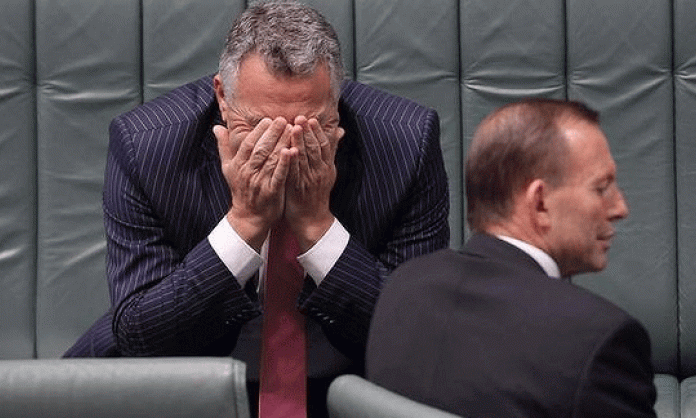Opinion polls consistently have shown that the government has failed to persuade us that pensions should be lowered, tertiary education deregulated, petrol made more expensive and universal health care destroyed.
And Joe Hockey can’t help but betray every attempt he makes to prove himself a man of the people; a treasurer with a social conscience. He’s dancing on budget night, chomping fat cigars while comparing the proposed Medicare co-payment to cigarettes and beer, taking an overseas holiday while continuing to declare the age of entitlement over for welfare recipients, justifying the petrol tax with claims that poor people don’t drive cars and publicly lauding the rich as the nation’s true heavy lifters.
The government not only has lost the battle to sell the budget to working class people. Its own friends also have turned in frustration. On one hand, there are the right wing political and economic commentators who support the government’s project of attacking workers and the poor. Most of the budget has been passed – but only about half of the harsh attacks targeting the least well off have made it through. The political right fear that the latter project is exhausted and that the longer the carnival goes on in the Senate, the more discredited the government will become. If it runs out of political capital, the rest of its agenda will be in jeopardy.
Senior News Corp economics commentator Terry McCrann wrote on 22 July that the government should “move away from a reality and even more an impression of crisis after crisis in the Senate … [and] give up on trying to get the ‘nasties’ in Joe Hockey’s Budget through”.
A week later, News Corp national economics editor Jessica Irvine wrote, “In its hubris, the Abbott Government has proved even more inept at pushing through its agenda than Labor was in its last term … It’s time, after the failure of the budget, for the government to refocus on phase two of its reform agenda.”
“Somewhere along the path”, wrote Australian Financial Review political editor Laura Tingle on 9 August, “… the whole budget process has gone seriously off the rails as a political exercise”.
The Herald Sun’s right wing prize fighter Andrew Bolt underlined the angst in late August. “For God’s sake put the country out of this misery”, he counselled the PM. “End these Budget negotiations now … almost every contentious spending cut … is dead. The only question now is how long you want to let prize jerks humiliate you.”
On the other hand, very few of the business class have shown any urgency to come out swinging behind Abbott and Hockey. Irvine quoted Reserve Bank governor Glenn Stevens as saying, “My sense is that in a lot of areas of business, people are sitting around tables saying, ‘yeah, somebody needs to do something’, and we’re waiting for someone else to do it.”
That tension has led to sparring. Tingle cited Hockey’s address to a public service conference in Canberra a month ago. “[E]veryone is against me … they’re abandoning the argument for good reform”, he whinged. “[W]ho is keeping the pressure on both sides of politics to develop the bipartisan support for real reform? … The business community is weaker than it has been over many years, as a voice.” Former Howard-era IR minister Peter Reith backed him up, writing in the Age that the Business Council “should be louder”.
But Australian Industry Group chief executive Innes Willox, responding to Hockey, said that “it’s not the role of the business community to be cheerleaders”. Tingle also went on to cite a stinging rebuke of the treasurer from Nestle and Bank of Melbourne chairperson Elizabeth Proust: “[M]any of the measures – the GP co-payment for example – are seen to fall unfairly on those who can least afford it, and I would suspect that’s the reason holding business back from [strongly arguing the government’s case].”
That the capitalists’ main concern is fairness for workers and the poor is a load of PR BS. More clear from the responses is that, despite the bosses broadly backing the government’s attacks, few of them believe that there is an immediate “budget emergency”. They want the attacks, they want the long term “structural reform” that comes with lower pensions and user pays health care, but they too possibly think that the budget now has become a distraction from the main game: flagging business investment and an uncertain economic outlook.
Exactly how the government will respond in the coming weeks or months is not clear. Perhaps it will let the “nasties”, as McCrann calls them, slide and find other ways to cut funding to social services. Perhaps it and the opposition parties will find a compromise.
Whatever there is to make of the infighting and the seeming political gridlock, we know that the establishment wants to continue attacking workers. There is a longer term agenda of “tax reform” and industrial relations law changes that bosses want implemented so they can increase profits directly – a wish list that includes scrapping or at least lowering penalty rates for weekend and shift workers, reducing corporate taxes and the income taxes of the rich while increasing the indirect taxes that fall more on the working class.
The rich are not going to give up until they get what they want. Our side has to continue to rebuild in order that we can resist effectively.








